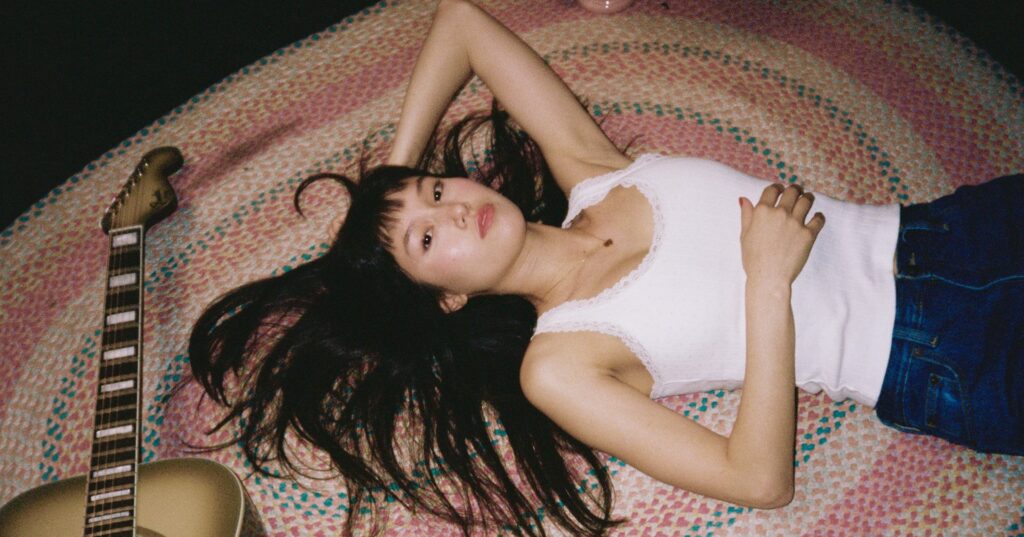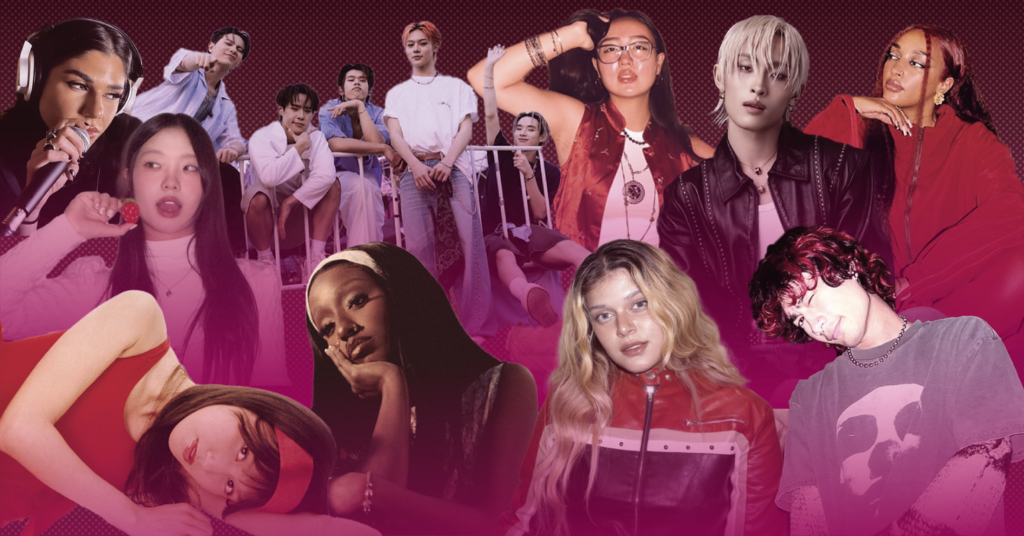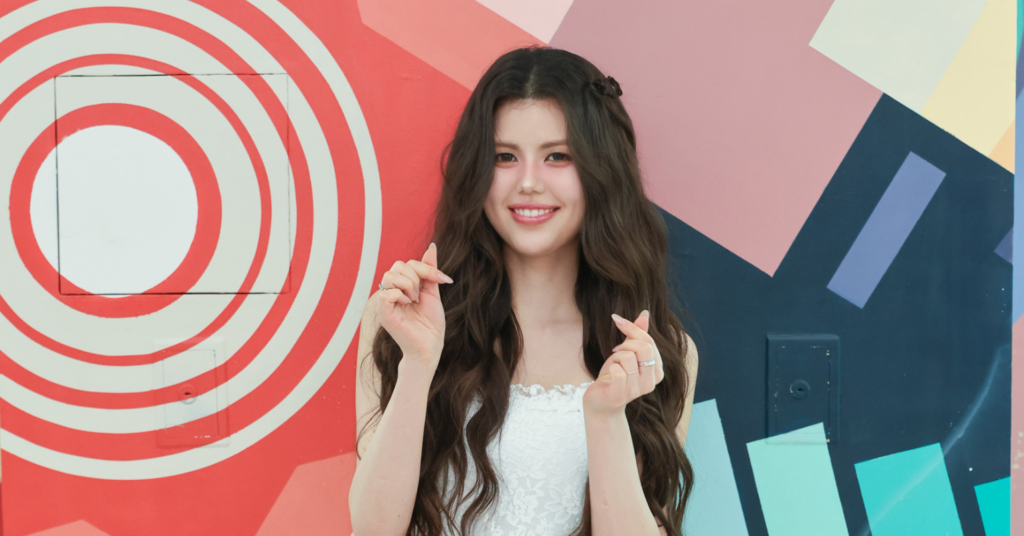Artist Spotlight: Juliet Ivy on “tiny but scary” and What It Means to Be Alive

Juliet Ivy doesn’t shy away from death.
“I can talk about [death and existence] for hours,” the singer-songwriter told EnVi over Zoom. Ivy credits her passion for these topics to her dad who is a psychologist. Growing up, she shared conversations with him about the human brain and this “inspired [her] fascination for human behavior.”
Death, existence, and existentialism soon bled into her art, starting with her breakout song “we’re all eating each other” which explored nihilism and death. In a viral performance, Ivy strums her now-iconic butterfly guitar and against an upbeat ballad, she sings about our inevitable deaths and the cycle of life.
In her latest EP tiny but scary, she further explores human nature and the meaning of our existence. From examining our tendencies to compare ourselves to musings about growing up, she dissects philosophical questions of existence with her witty, diaristic lyrics fans have come to know and love.
Since the EP’s release in August, tiny but scary has reached over a million streams. The EP’s debut into the world has been what Ivy described as a “special experience.” She continues to be “grateful every day for music and for the people who listen to it.”
EnVi caught up with Juliet Ivy after her headline concert in London to talk about her creative process behind tiny but scary, her inspirations, and what it means to be alive.

A Full Circle Moment
Ivy’s musical aspirations stemmed from childhood. She fondly recalled her early musical memories which included playing karaoke video games. However, it wasn’t until she began college research when she “found that you can study music and work to become an artist.”
“I didn’t understand [how] anyone could enter this industry,” she explained. “[Then] I found out that you can study [music] and build [your career] like an entrepreneur in the music industry.” While in university, Ivy began pursuing creative projects, releasing songs like “ZOOM” and “breakfast song.” She learned the different creative processes of artists and went on to make music with her friends. “It was such a fun learning experience,” she told EnVi.
Ivy soon discovered her passion for incorporating the human experience and existentialism into her songs when she started doing solo music sessions. Soon enough, songwriting and lyrics became her favorite part of the creative process. “I felt super connected to lyrics when I first [started] doing [my sessions],” she said, excitement palpable on her face. “So my songwriting process really always revolves around lyrics and I’ve stuck to that to this day. I really like to start with concepts and words and then build the songs around that.”
Earlier this year, Ivy made her festival debut at Forest Hills Stadium, a stage she’s watched since childhood. “I’ve been sitting in those seats since I was little,” she said. “I looked at the stage and wondered if one day I’ll stand there. [Forest Hills Stadium] is my Madison Square Garden. It’s so close to home, and it’s a beautiful venue. It’s my favorite one in the world. ”
She described her performance as a “full-circle moment.” Her family, friends, and community all went out to see Ivy perform. “I was crying and just so grateful. It was the best day ever,” she gushed.
Existence Is “tiny but scary”
As a child, Ivy would have nightmares about “what happens after earth?”
“It would just keep me up. To this day, I [still] can’t wrap my head around what existence is. It blows my mind,” she told EnVi. Questions about her purpose and how to spend her time on this earth would “pass [her] mind all the time.” Ivy would come to convey these questions and feelings of uncertainty into “tiny but scary.”
The title of her EP came from a lyric in her song “is it my face?” which explored insecurity and alienation. But as she developed her EP, the phrase “took on more meaning.” The EP examines growing up, insecurity, relationships, and existence as a whole, which Ivy found all resonate with the lyric “tiny but scary.” She explained that as an existentialist, there is this “mindset [that] nothing matters, and [everything is] tiny. But it also feels really big and scary.”

Ivy’s cover art further emphasizes this message. “I wanted something emotive and personal,” Ivy explained. Compared to “playpen” where Ivy was featured further away in the cover art, “tiny but scary” is a close-up of Ivy’s face; an invitation to listeners to a more personal connection.
“I felt like this project was welcoming people into my brain and getting to know me in a more personal way,” Ivy said. “So I felt like the cover art should be up close and personal as well.”
A Glimpse Into the Future
When asked which song was the most therapeutic to write, Ivy answered “four foot two” and “sweet dreams.” She went on to describe “four foot two” as the Before and “sweet dreams” as the After.
In “four foot two,” Ivy opens with an image of a child waiting for “a pink animal balloon.” The child goes on to “wait in line in a crowded room” for what listeners can assume is an audition. This image is juxtaposed with Ivy singing from the perspective of the child’s future self, “I wish I could be like her / I barely get out of bed.”
Ivy wrote “four foot two” when she “was going through a horrible time.” Through writing the song, it “brought [her] out of it.” She emerged from this song with the realization that in hurting yourself, you are hurting this younger version of you. “I need to take care of myself,” Ivy said, recounting her epiphany. “My younger self doesn’t deserve to feel like this.” She echoes this in the song’s deeply nostalgic chorus, singing, “When I’m hurting me, I’m hurting / her.”
Conversely, “sweet dreams” describes a character emerging from a dark night. The song is told from an omniscient point of view as the narrator witnesses their previous hardships. When she wrote “sweet dreams,” Ivy said she “made it to the place [she] wanted to get [herself] to.” The song is telling the older version of herself that she is going to make it.
“Four foot two” and “sweet dreams” are what Ivy described as “part of a full circle” and stand as reminders to listeners that everything will get better.
The Next Step Forward
Ivy views tiny but scary as an extension to her playpen era. Her EPs serve as an introduction to her personal reflections on life. But while her creative processes for both EPs are similar, her current project is thrusting her into a new era. However, Ivy is no stranger to embracing change.
She described how her upbringing in her Colombian and Chinese household taught her to be proud and embrace “the different parts of [herself].”
“I think that’s the biggest thing that comes from growing up [a part of] two different cultures,” Ivy said. “[It’s] learning to be proud [and] embracing everything that makes me, me.”
She brings this spirit into her creative pursuits and this taught her not to be defined by a specific “genre, sound, look, or personality.” By embracing all forms of art, she remains “open minded to all styles of music and inspiration.”
This is evident in her career thus far as she continues to break genre barriers in the music industry. From her unique and often buoyant melodies to her dissections of philosophical questions, there is no doubt she’ll emerge triumphant in her next creative pursuit.
Keep up with Juliet Ivy on Instagram, X and TikTok.
Interested in reading more of our interviews with creatives like Juliet Ivy? Check out our interview with music producer August Rigo here!



